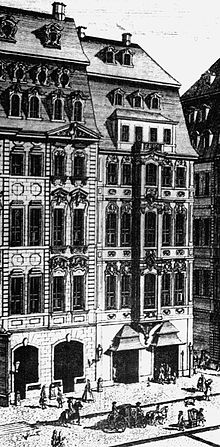Be silent, do not chat
| Bach cantata | |
|---|---|
| Be silent, do not chat | |
| BWV: | 211 |
| Occasion: | Performance of the Bach Collegium musicum |
| Year of origin: | 1734? |
| Place of origin: | Leipzig |
| Genus: | Secular cantata |
| Solo : | STB |
| Instruments : | Flute; Str; Bc |
| AD : | approx. 27 min |
| text | |
| Picander | |
| List of Bach cantatas | |
Be silent, keep quiet, don't chat ( BWV 211), also known as coffee cantata , is a secular cantata by Johann Sebastian Bach .
Emergence
The work is based on a poem by Picander , which he published in 1732. The cantata was probably written in 1734 to be performed in the Zimmermann coffee house in Leipzig . The text must have been popular at the time because it was taken up by at least two other composers in addition to Bach, although only Bach's interpretation has an additional final section, the authorship of which is not secured by Picander or Bach himself. It is assumed that Bach directed the world premiere of the cantata at Café Zimmermann in Leipzig .
content
In contrast to most of Bach's other secular cantatas, this work is not an homage to the authorities, but rather humorously and ironically sketches a scene from the bourgeois life of the people of Leipzig: Mr Schlendrian (bass) tries with furious threats from his daughter Liesgen (soprano) the bad habit of Get rid of daily coffee drinking. Only when he promised her permission to marry does the headstrong daughter initially give in to the aria “Today, dear father does it”, but in the subsequent recitative the narrator secretly lets it be spread that she only accepts a man who she is allowed to drink coffee at any time in marriage. The cantata ends with an ironic, conciliatory trio of the three vocal soloists, “The cat doesn't let the mousy”.
sentences
- Recitative (tenor): Be silent, keep quiet, don't chat
- Aria (bass): You don't have it with your children
- Recitative (soprano, bass): You bad child, you loose girl, oh!
- Aria (soprano): Egg! how does the coffee taste sweet
- Recitative (soprano, bass): If you don't leave me the coffee
- Aria (bass): girls by the hard senses
- Recitative (soprano, bass): Now follow what your father says!
- Aria (soprano): Today, dear father
- Recitative (tenor): Now the old sloppy goes looking
- Trio: The cat does not let the mouse mouse
occupation
- Narrator ( tenor )
- Mr. Schlendrian, the father ( bass)
- Liesgen, his daughter ( soprano )
- Instrumental ensemble consisting of transverse flute , 2 violins , viola and basso continuo
particularities
The work is unusual for Bach in that, unlike almost all of Bach's other cantatas, it neither falls into the genre of church cantatas nor belongs to the group of homage music for a princely house. It reveals a certain sense of humor on the part of the composer, who knows how to caricature the characters of the characters with musical means. Probably the best known of the total of 10 movements is Liesgen's aria "Ei!" Accompanied by the transverse flute. how does the coffee taste sweet ”.
literature
- Alfred Dürr : Johann Sebastian Bach. The cantatas. Bärenreiter, Kassel 1999, ISBN 3-7618-1476-3 .
- Werner Neumann : Handbook of the cantatas JSBachs. 1947, 5th edition 1984, ISBN 3-7651-0054-4 .
- Hans-Joachim Schulze: Ey! How does the coffee taste sweet - Johann Sebastian Bach's coffee cantata in its time. Verlag für die Frau, Leipzig 1985, ISBN 3-7304-0056-8 .
- Hans-Joachim Schulze: The Bach Cantatas: Introductions to all of Johann Sebastian Bach's cantatas (Edition Bach Archive Leipzig). Evangelische Verlags-Anstalt, Leipzig / Carus, Stuttgart 2006, ISBN 3-374-02390-8 (EVA), ISBN 3-89948-073-2 (Carus).
- Christoph Wolff , Ton Koopman : The world of Bach cantatas. JB Metzler, Stuttgart / Weimar 2006, ISBN 3-476-02127-0 .

